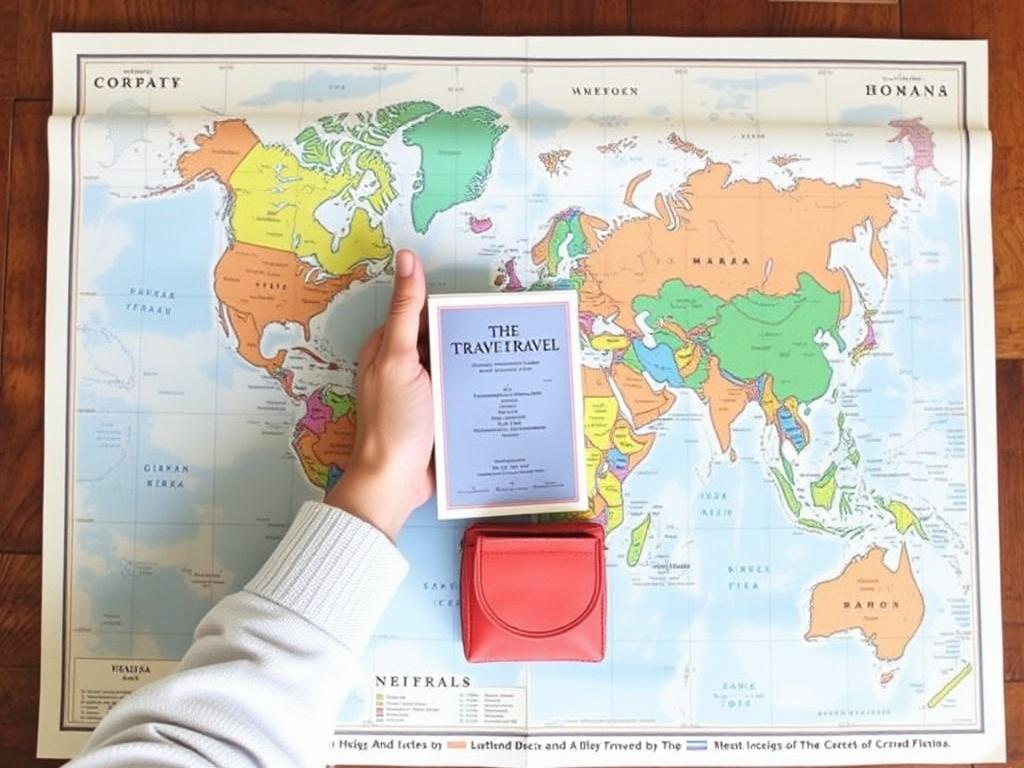Traveling the world for an extended period can be one of the most rewarding experiences in life. From exploring vibrant cities to relaxing on pristine beaches, the opportunity to immerse yourself in different cultures is truly priceless. But, as exciting as globe-trotting is, managing your money wisely during extended world travel is essential to ensure your journey stays smooth and stress-free. Handling finances abroad can be daunting, especially when juggling multiple currencies, unexpected expenses, and varying costs of living. The good news is, with careful planning and smart strategies, you can master how to manage finances during extended world travel and enjoy the adventure without constantly worrying about your bank balance.
Creating a Realistic Travel Budget

Before you even book your flights, the first step in managing your finances for long-term travel is creating a realistic budget. This involves estimating your daily expenses and factoring in costs like accommodation, food, transportation, activities, visas, and insurance. Remember, costs vary drastically between countries. For example, Southeast Asia is known for being budget-friendly, while Western Europe or Japan can be much more expensive.
Start by listing your anticipated expenses in categories. One useful method is to break costs down into fixed and variable expenses:
| Fixed Expenses | Variable Expenses |
|---|---|
| Flight tickets | Meals and groceries |
| Travel insurance | Transportation within cities |
| Visas and permits | Activities and tours |
| Accommodation (if booked in advance) | Souvenirs and shopping |
Once you have a clear understanding of your costs, add a contingency fund of 10-20% for emergencies or unexpected expenses. This cushion will help keep you financially secure if plans change or sudden costs crop up.
Best Ways to Access Money Abroad
Knowing how to access your money safely while traveling is crucial. Carrying large amounts of cash is risky, but relying on one payment method isn’t ideal either. Instead, diversify the ways you access your funds, so you’re never stranded without money. Here are several options commonly used by extended travelers:
1. International Debit Cards
Using a debit card linked to your home bank account can be convenient. Withdraw cash from ATMs abroad when needed, but be mindful of potential fees for foreign ATM usage and currency conversion. Many banks now offer accounts designed for travelers with minimal fees, so check your options before you leave.
2. Credit Cards
Credit cards are handy, especially for large purchases or booking accommodation and flights online. Choose one with no foreign transaction fees, and always pay off the balance promptly to avoid interest charges. Some cards also offer travel insurance benefits.
3. Prepaid Travel Cards
Prepaid travel cards allow you to load a certain amount in various currencies onto one card. They can limit overspending and avoid bank fees, but watch out for loading fees or ATM withdrawal limits.
4. Mobile Payment Apps
In many countries, apps like Google Pay, Apple Pay, or local payment platforms are widely accepted. Set these up before your trip for added convenience and security.
5. Cash
It’s smart to keep a small amount of cash in your main currency or in widely accepted currencies like USD or Euros. This can help in places where card payments are not accepted or during emergencies.
How to Manage Currency Exchange Smartly

One tricky aspect of extended travel is dealing with multiple currencies efficiently. Exchange rates fluctuate, and poor rates can cost you a lot over time. Here are some tips for handling currency exchange wisely:
- Plan Ahead: Exchange some currency before you leave, especially for your first destination, so you’re not scrambling for cash on arrival.
- Use Local ATMs: Usually, withdrawing cash from ATMs in your destination country provides better exchange rates than currency exchange booths.
- Avoid Airport Exchanges: Currency exchange counters at airports often have the worst rates and high commissions.
- Monitor Exchange Rates: Use apps to track rates and convert money when rates are favorable.
- Use Multi-Currency Accounts: Some banks offer accounts that hold multiple currencies, allowing you to convert money at better rates online when convenient.
Keeping Track of Your Expenses

When you’re hopping from country to country, it’s easy to lose track of how much you’re spending. Without good record-keeping, you might unknowingly blow your budget. Fortunately, simple tools make this manageable:
1. Expense Tracking Apps
Apps like Trail Wallet, Mint, or Spendee are designed for travelers and give you a clear picture of your spending in real time. You can categorize expenses, set daily or weekly limits, and sync data across devices.
2. Manual Spreadsheets
If you prefer more control, keeping an Excel or Google Sheets spreadsheet can work well. Update it daily with your expenses and compare them to your budget.
3. Keep Receipts and Notes
When offline, keep paper receipts and jot down expenses in a travel journal. Upload or digitize them later to stay organized.
How to Save Money While Traveling Long-Term
Extended world travel can become expensive if you’re not careful. Luckily, there are many ways to stretch your dollars without compromising experiences:
- Choose Budget Accommodation: Hostels, guesthouses, or home-sharing platforms often provide cheaper lodging than hotels.
- Cook Your Own Meals: Buying groceries and making food can drastically cut down daily costs.
- Use Public Transportation: Avoid taxis and rent bicycles or use buses and trains instead.
- Travel Slow: Spending more time in each place reduces transport costs and allows you to find local deals.
- Look for Free Attractions: Many cities offer free walking tours, museums, and parks.
- Work or Volunteer: Consider working part-time or volunteering in exchange for accommodation or food, which can save money and enrich your experience.
Protecting Your Finances and Identity
Safety should be a top priority when managing money on the road. Financial scams and theft can ruin your travel plans, so take precautions:
Tips for Financial Security:
- Inform your bank of your travel plans to prevent card blocks.
- Use strong passwords and two-factor authentication for online banking.
- Carry photocopies of important cards and documents separately from the originals.
- Use RFID-blocking wallets to protect card information from theft.
- Be cautious with public Wi-Fi when accessing financial accounts.
- Consider travel insurance that covers theft and lost money.
How to Handle Unexpected Expenses Abroad
Even with excellent planning, unexpected costs can arise—such as medical bills, flight changes, lost items, or emergencies. Being mentally and financially prepared reduces panic:
- Maintain an emergency fund in an accessible account.
- Keep emergency cash hidden separately from everyday money.
- Have contact information for your home bank and embassy handy.
- Consider credit cards with emergency cash advance features.
Planning how to handle unexpected expenses is critical to continuing your trip without major interruptions.
Tips for Sending Money to Yourself or Others
During long-term travel, there may be occasions you need to send or receive money internationally, whether you’re transferring savings online or supporting family back home.
Popular Methods Include:
| Method | Pros | Cons |
|---|---|---|
| Online Money Transfer Services (Wise, Remitly) | Fast, low fees, good exchange rates | Requires online access, verification process |
| Bank Wire Transfers | Secure, good for large amounts | Can be slow, higher fees |
| Cash Pickup Services | Allows recipients to collect cash easily | Higher fees, less secure |
| Peer-to-Peer Payment Apps | Convenient for short distances | Limited international availability |
Before sending money, always compare fees and exchange rates to maximize value.
The Importance of Travel Insurance in Financial Planning
While not strictly a part of daily finance management, travel insurance plays a vital role in your financial health during extended travel. Coverage for medical emergencies, trip cancellations, and lost belongings can save you thousands of dollars. Choose a plan that fits the duration and activities of your trip, and review the policy carefully to understand coverage limits and exclusions.
Adapting Your Financial Plan as You Travel
Flexibility is key when managing finances internationally. Costs can change with season, location, and personal habits. Regularly reassess your budget and spending:
- Track your spending weekly and adjust your budget.
- Switch strategies if necessary, like changing accommodation styles or travel pace.
- Be open to new money-saving opportunities that present themselves.
By staying adaptable, you keep control of your money no matter where your journey takes you.
Conclusion
Handling finances during extended world travel may seem overwhelming at first, but breaking it down into manageable steps makes it easier and even empowering. Creating a realistic budget, diversifying access to money, tracking expenses meticulously, and embracing money-saving strategies all contribute to a worry-free travel experience. Protecting your finances with good security practices and travel insurance ensures you’re prepared for unforeseen emergencies. Lastly, staying flexible and adjusting your plans as you go along will help keep your adventure financially sustainable. With the right mindset and tools in place, you can focus on soaking in the incredible experiences the world has to offer, without letting money troubles hold you back.









